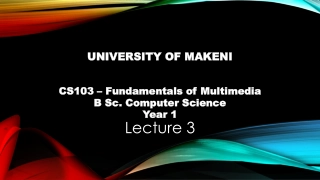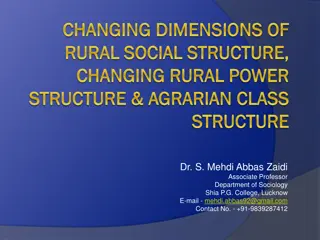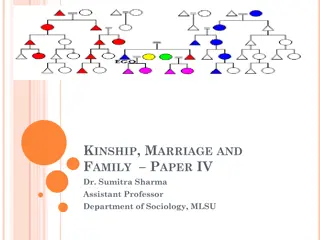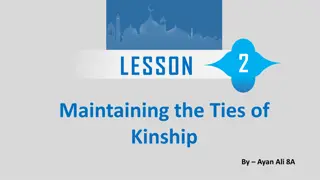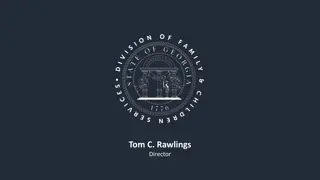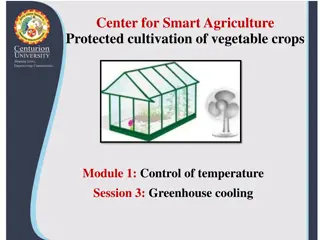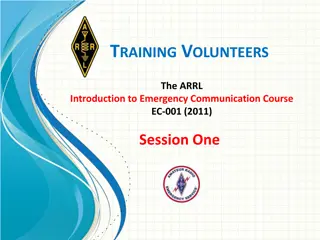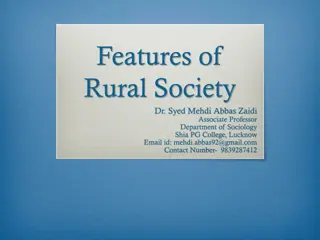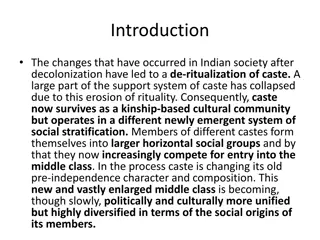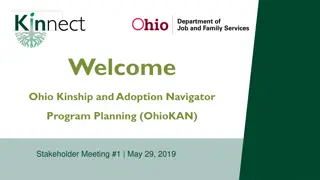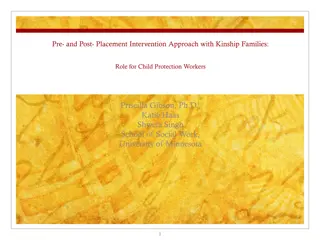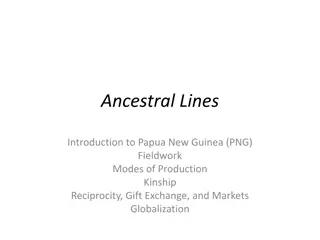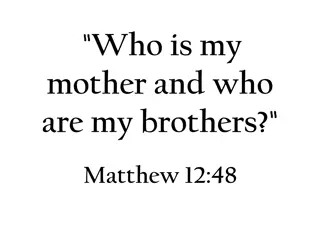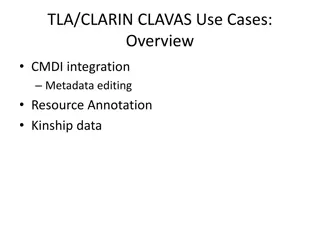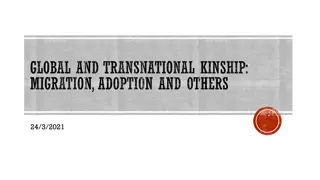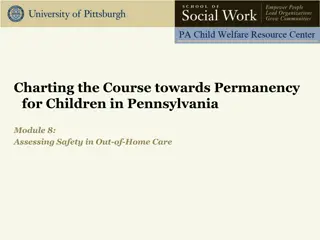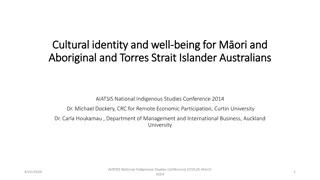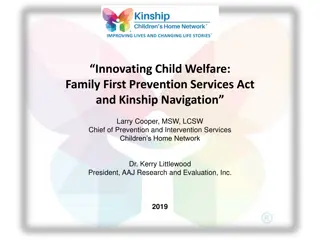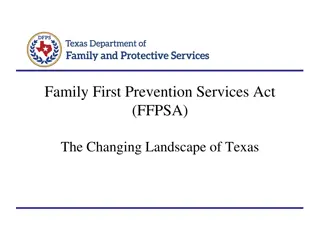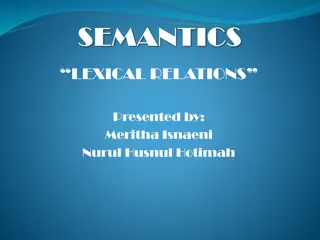Understanding Multimedia Systems: Hardware and Software Components
Multimedia systems require specific hardware and software components to meet the demands of producing and playing multimedia content. Development systems are used for creating content with higher specifications, while playback systems are used for playing multimedia files with lower specifications.
8 views • 46 slides
Embedded Systems Design Process in the Embedded systems
Embedded systems are all around us, from the tiny microcontrollers in our household appliances to the sophisticated control systems in cars and aeroplanes. But how are these systems designed? Let's delve into the basics of the embedded systems design process in simple terms that anyone can understan
2 views • 9 slides
Changing Dimensions of Rural Social Structure in India
Rural social institutions in India have deep historical roots, encompassing family, kinship, caste, class, and village structures. This complexity reflects a wide range of social norms, values, roles, and obligations. Changes in the caste system and the practice of jajmani are also highlighted, show
2 views • 21 slides
Overview of Distributed Systems: Characteristics, Classification, Computation, Communication, and Fault Models
Characterizing Distributed Systems: Multiple autonomous computers with CPUs, memory, storage, and I/O paths, interconnected geographically, shared state, global invariants. Classifying Distributed Systems: Based on synchrony, communication medium, fault models like crash and Byzantine failures. Comp
9 views • 126 slides
Iravati Karve - Renowned Anthropologist and Sociologist
Iravati Karve (1905-1970) was a distinguished anthropologist, sociologist, educationist, and writer known for her work on kinship, Indian culture, and the Mahabharata. Through her major works and analysis of kinship organization in India, Karve made significant contributions to understanding regiona
2 views • 14 slides
Operating Systems
An operating system is a crucial program that manages all other programs on a computer. It handles tasks like input recognition, file management, and device control. There are different types of operating systems such as single-user, single-task systems, multi-user, multi-task systems, real-time ope
6 views • 11 slides
Understanding Information Systems in Organizational Management
Management in organizations is divided into three levels: operational, tactical, and strategic. Each level requires different information systems to support various activities. Operational systems focus on routine transactions and control processes, while middle-level systems aid in semi-structured
9 views • 39 slides
Understanding the Kanda System in Matrilineal Societies
The Kanda system was a key aspect of matrilineal descent groups that controlled land and kinship relations in C16 societies. Kandas had flexible structures, varying from hierarchical to egalitarian, with chiefs playing different roles. Key features included defined names, traditions, and autonomy in
2 views • 14 slides
Understanding Kinship, Marriage, and Family: Key Concepts and Readings
Explore the intricate web of social relationships that define kinship, marriage, and family structures in human societies. Delve into basic concepts such as consanguinity and affinity, kinship terminology, marriage rules, family composition, and changing patterns in India. Essential readings by reno
0 views • 12 slides
Understanding the Importance of Maintaining Family Ties in Islam
Explore the significance of maintaining ties of kinship in Islam through teachings and practices. Learn why nurturing relationships with family members is key to fostering harmony and unity in society, as emphasized by Prophet Muhammad. Discover the virtues of upholding kinship bonds and the rewards
1 views • 15 slides
Understanding Family Preservation Services in Child Welfare
Family Preservation Services (FPS) offer short-term, family-focused interventions to support at-risk children and families in crisis situations, aiming to prevent out-of-home placements due to neglect or abuse. FPS involve a continuum of community-based services designed to strengthen family stabili
0 views • 14 slides
Introduction to Database Management System Explained
This presentation covers the basics of database management systems, including definitions of data, types of data, structured and unstructured data, storing data in computers using file systems and database systems, and issues with file systems like data redundancy, inconsistency, difficult data acce
1 views • 18 slides
Understanding Different Types of Recommender Systems
Recommender systems play a crucial role in providing personalized recommendations to users. This article delves into various types of recommender systems including Collaborative Filtering, Content-Based, Knowledge-Based, and Group Recommender Systems. Collaborative Filtering involves making predicti
0 views • 7 slides
Efficient Greenhouse Cooling Systems for Smart Agriculture
Active summer cooling systems like fan-and-pad and fog systems are crucial for maintaining optimal temperatures in greenhouses. These systems work by utilizing evaporation to remove heat from the air. Fan-and-pad cooling systems have been in use since 1954, where water is passed through pads to cool
1 views • 23 slides
Understanding Emergency Communication Systems for Volunteer Training
This content covers various topics related to emergency communication systems for volunteer training, including agency communication systems, government radio systems for police and fire departments, emergency medical radio systems, American Red Cross frequencies, and types of served-agency radio sy
2 views • 29 slides
Introduction to Embedded Systems Design
Embedded Systems Design, Chapter 1 provides an insightful overview of embedded systems, distinguishing them from general-purpose computers. The chapter delves into the characteristics of embedded systems, their design considerations, and the various types of embedded computers such as general-purpos
1 views • 7 slides
Understanding Features of Rural Society by Dr. Syed Mehdi Abbas Zaidi
Rural society, as explained by Dr. Syed Mehdi Abbas Zaidi, is characterized by agriculture as the primary occupation, dependence on nature, extended kinship groups, traditional practices, religious beliefs, joint family system, kinship dynamics, Jajmani system, homogenous culture, lack of specialize
0 views • 9 slides
Evolution of Caste in Post-Colonial Indian Society
Changes in Indian society post decolonization have led to the de-ritualization of caste, resulting in a shift towards a kinship-based cultural community operating in a new system of social stratification. Secularization of caste has detached it from ritual hierarchy and aligned it with competitive d
5 views • 10 slides
Understanding Ethnicity and Ethnic Conflicts
The concept of ethnicity involves both primordial and constructivist perspectives, with primordialists viewing it as an inherited identity and constructivists as a social construct based on fictive kinship. Perceived differences among ethnic groups can lead to conflicts, often rooted in historical e
0 views • 23 slides
Understanding Barrier Crimes for Foster Parents in Virginia
This presentation discusses barrier crimes in Virginia concerning individuals seeking to become kinship foster parents. It covers policy decisions, federal laws, time limits for certain crimes, exceptions, and waivers. The content highlights the differences between federal and Virginia laws, the aut
0 views • 25 slides
Understanding Private Fostering Arrangements and Responsibilities
Private fostering arrangements involve caring for a child without local authority involvement, lasting 28 days or more. These arrangements differ from approved foster care and kinship care, raising concerns about safeguarding vulnerable children. Reasons for private fostering range from educational
0 views • 9 slides
Ohio Kinship and Adoption Navigator Program Overview
The Ohio Kinship and Adoption Navigator Program, known as OhioKAN, aims to develop a statewide program for kinship and adoption support. The program involves researching existing models, forming a stakeholder group, utilizing Implementation Science Approach, conducting regional town hall meetings, a
0 views • 18 slides
Pre- and Post-Placement Intervention Approach with Kinship Families
This research study explores direct service practices with kinship families, focusing on themes post Breakthrough Series Collaborative. The study involves analyzing case reviews and conducting personal interviews to identify emerging themes in child protection work with kinship caregivers. The purpo
0 views • 16 slides
Exploring Papua New Guinea: Fieldwork and Cultural Diversity
Delve into the rich cultural tapestry of Papua New Guinea through discussions on fieldwork modes of production, kinship, reciprocity, gift exchange, and markets. Gain insights into the unique challenges faced by rainforests in Amazon, Central Africa, and Southeast Asia, emphasizing their crucial rol
0 views • 6 slides
Contemplating the Meaning of Family in Matthew 12:46-50
Exploring the biblical passage in Matthew 12:46-50 where Jesus redefines family, emphasizing the importance of spiritual kinship through obedience to God's will rather than biological relationships. Jesus emphasizes that those who do God's will are considered family, challenging traditional notions
0 views • 15 slides
Information Systems in Organizations: Overview and Implementation
Information systems play a crucial role in organizations, encompassing transaction processing systems, functional area information systems, and enterprise resource planning systems. This content delves into the purpose of transaction processing systems, the support provided by information systems ac
0 views • 30 slides
Integrating CMDI for Metadata Editing and Kinship Data Annotation
Explore the integration of CMDI for metadata editing in resources, including open/closed vocabularies, Arbil interface for vocabulary management, ELAN for resource annotation, and KinOath for kinship data. Discover how CMDI improves data annotation and vocabularies management in linguistic research.
0 views • 10 slides
Global and Transnational Kinship: Migration, Adoption, and Others
Explore the complexities of global and transnational kinship through narratives of Vietnamese individuals navigating relationships with Czech and Vietnamese grandmothers. These stories highlight feelings of belonging, identity, and cultural connections in the context of migration and family ties.
0 views • 30 slides
Understanding Cascade Control Systems in Industrial Processes
Cascade control systems play a crucial role in improving process control efficiency by incorporating feedback loops within feedback loops. This type of control architecture helps to better handle disturbances and variations in the process by creating secondary loops that monitor specific parameters.
0 views • 8 slides
Understanding Therapeutic Parenting for Children with Trauma and Attachment Disruption
Therapeutic parenting is a child-centered approach tailored to address the complex emotional and behavioral needs of kinship, adopted, or permanent care children who have experienced attachment disruption and trauma. It focuses on nurturing, empathy, and building trust while refraining from conventi
0 views • 13 slides
Assessing Safety in Out-of-Home Care for Children in Pennsylvania
This module focuses on evaluating safety in out-of-home care for children in Pennsylvania by exploring characteristics of safety and a safe environment. It delves into assessing how children and caregivers behave, the family dynamics, and community connections to sustain safety. The goal is to equip
0 views • 86 slides
Understanding Social Structure: Meaning, Elements, and Types
Social structure is the arrangement of social units within a society, encompassing groups, institutions, associations, and organizations. It consists of normative systems, position systems, and sanction systems to maintain order and function harmoniously. Social institutions play a vital role in pre
0 views • 9 slides
Exploring Cultural Identity and Well-being Among Indigenous Australians
This study delves into the intricate relationship between cultural identity and well-being among Māori and Aboriginal/Torres Strait Islander Australians. It examines the impact of colonialism on identity, emphasizing the importance of connections to land, family, and kinship systems in shaping iden
0 views • 13 slides
Advancements in Statistical Genomics: FarmCPU and Method Development
Exploring the evolution of statistical genomics techniques, this lecture delves into the history of FarmCPU and BLINK, addressing challenges in GWAS and the development of models like PC+SNP+e and PC+Kinship+e. It also covers popular software packages in the field and the importance of moving beyond
0 views • 24 slides
Empowering Families: Family First Prevention Act and Kinship Care
Exploring the innovative approaches of the Family First Prevention Services Act and Kinship Navigation, this presentation discusses the importance of prevention services, building community support for kinship care, implementing Kinship Navigator programs, and the implications and future directions
0 views • 29 slides
Understanding the Family First Prevention Services Act (FFPSA) in Texas
The Family First Prevention Services Act (FFPSA) aims to improve outcomes for children in congregate care, kinship caregivers, parents struggling with substance abuse, and children at risk of entering foster care. FFPSA focuses on decreasing congregate care usage, preventing additional foster care e
0 views • 22 slides
Understanding Embedded Systems and Cyber-Physical Systems
Embedded systems are specialized computer systems embedded within larger systems, such as control systems and car controllers. This lecture covers real-time aspects, applications of Cyber-Physical Systems (CPS), and examples like the Boeing 777/Airbus A380 cockpit. It discusses the design process of
0 views • 22 slides
Impact of Islamic Beliefs on Reproduction among Syrian Refugees
This study explores how Islamic beliefs influence experiences of reproduction among Syrian refugees in Jordan, considering the intersection of religion, gender, and culture in the context of displacement and migration. It investigates how religiously-informed notions of kinship, motherhood, and gend
0 views • 23 slides
Understanding Lexical Relations in Language
Lexical relations play a crucial role in understanding the meanings of words in any language. They encompass relationships like entailment, paraphrase, and contradiction, shedding light on how lexemes are interconnected. Additionally, lexical fields and kinship systems offer further insights into ho
0 views • 10 slides
Supporting Grandparents Raising Grandchildren Advisory Council Meeting Summary
The Supporting Grandparents Raising Grandchildren Advisory Council Meeting on September 15, 2020, included significant discussions led by key individuals such as Lance Robertson, Administrator/Assistant Secretary for Aging, and Lori Stalbaum from the Administration for Community Living. The meeting
0 views • 50 slides
